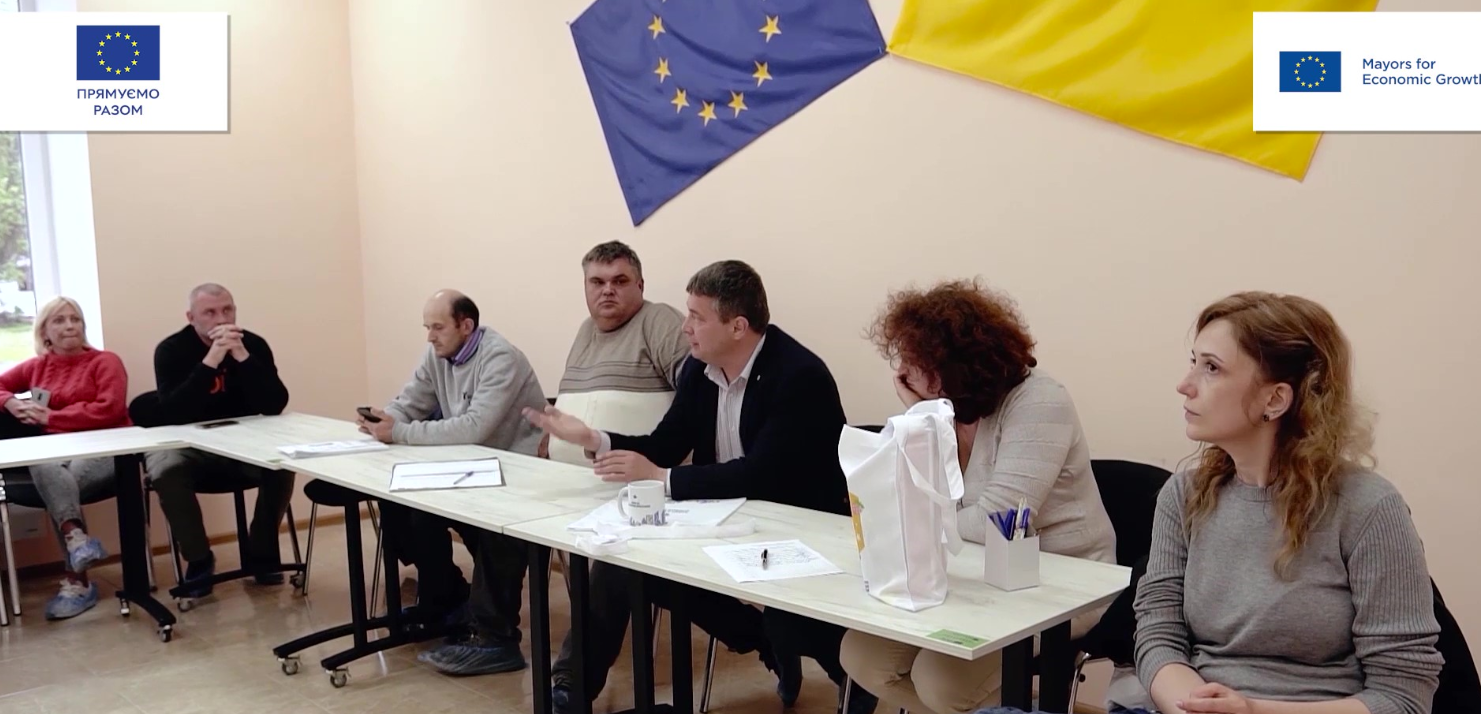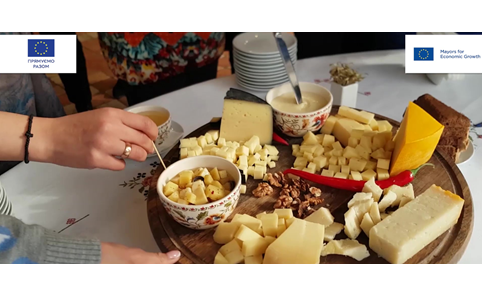
30 October 2020
"Different Communities – Joint Decisions for Economic Growth" – success story from Hlyboka, Ukraine
There are many very diverse signatories of the EU Initiative "Mayors for Economic Growth". They include large capital cities, seaport towns, small rural settlements, and even villages.
Of course, the problems they face in terms of economic development are also very diverse. While economic activity is basically concentrated in cities, rural areas are in the most difficult position, where the choice of development paths is not so wide… In almost every country in the world, there are discussions about how to revitalise villages whose economy is mainly based on agriculture with little added value, and the population suffers from unemployment and moves to cities.
It seems the Bukovina Community Development Agency (Ukraine), a regional Association of Amalgamated Territorial Communities, has a solution to this problem. The Association was created in 2016 and brought together 10 Amalgamated Territorial Communities of the Chernivtsi Region of Ukraine – Hlyboka, Voloka, Velyky Kuchuryv, Mamalyga, Vashkivtsy, Sokyryany, Rukshyn, Ust-Putyla, Nedoboivtsy, and Klishkivtsi.
In 2017, Hlyboka Amalgamated Territorial Community joined the M4EG Initiative and stepped forward with the pilot project "Different Communities – Joint Decisions for Economic Growth", which received EU financial support. A highly-motivated project team, well-thought-out approach to the implementation of activities, focus on developing partnerships, and work with the public have resulted in impressive achievements in 2.5 years of the project’s implementation. The initiative has demonstrated that:
- In rural areas, it is possible to build an effective system of institutional support for business in a short time
Thus, within the project, Economic Development Centres were opened in each of the 10 participating communities. In each community, the premises were selected, equipped with furniture and office equipment, and staffed by an administrator whose responsibility was to ensure the operation of the centre, monitor community requests and organise events according to these requests.
The centres are now used as venues for themed events for business, coworking spaces, places for meetings with government officials, community centres, meeting places of young people, and for exchanges of ideas.
Together with district employment centres in the Region, the project also provides trainings for young people on the possibilities of implementing best practices aimed at developing and supporting startups, especially in the field of creative economy.
- Cooperation is a powerful tool for the economic development of rural areas
One of the problems faced by agricultural producers is the small-scale nature of homesteads and farms, which is why local agricultural products often have low competitiveness and little added value.
Based on extensive consultations with community members, the project facilitated the creation of 10 new cooperatives and the expansion of the existing one, as well as sponsoring the purchase of respective equipment.
Thus, in the village of Mikhaylovka, Hlyboka District, a cheese factory was put into operation where about a dozen varieties of cheese are produced from local cow and goat milk. The members of the cooperative were able to deliver milk at prices twice as high as before, and local cheese products are gradually attracting connoisseurs, not only in the surrounding villages, but also in Chernivtsi and even outside Bukovina. The cheese factory also attracts tourists to the village – they come for cheese tastings and visit a small apitherapy center located in the village on the way.
Another example of successful cooperation is the "Honey" agricultural service cooperative in Rukshyn Amalgamated Territorial Community, which has already united several hundred beekeepers from the western region of Ukraine and continues to expand. The main tasks of the cooperative are improving the conditions for agricultural production, establishing a system for processing apiary products and forming large batches of products for export, and promoting beekeeping products to both domestic and foreign markets in order to ensure the profits of the producers.
As part of the promotion of the industry and its products, the members of the cooperative have plans to build a beekeeping museum in the community from scratch.
- Sustainable solutions are a smart multiplier of economic benefits
Due to its specifics, agricultural production is a promising area for "green" solutions. In Nedoboivtsy Amalgamated Territorial Community, a woodchopper and a manipulator that automates the collection of trimmings from trees were purchased as part of the project. In addition to maintaining the garden, this equipment benefits the environment. Earlier such trimmings were burned, and the smoke spread throughout the village, adversely affecting the health of residents. Now these trimmings are crushed and used to heat kindergartens with solid fuel boilers. The unit is mobile, and the village Council provides a tractor to move it.
- Local initiative and local leaders are key to sustainable growth
In Nedoboivtsy, there is an impressive example of how one successful large farmer can help his community. The owner of the Todosiychuk farm owns an apple orchard of 30 hectares and exports his products. He has an industrial refrigerator for storing crops and a sorting line for apples. Mr. Todosiychuk also owns the laboratories for the study of soil composition. He also provides this equipment for use to other small farmers who do not have such facilities. In addition, the owner maintains a volunteer fire department at his own expense. The village Council finances only the wages of one driver and pays for fuel when needed. The farmer adopted this experience after visiting a similar farm in Germany.
There is also a training centre on the basis of the Todosiychuk farm where various thematic trainings are held.
- Development and expansion of competitive advantages is the basis for the clustering process and increasing production efficiency
"The Treasures of Bukovina" in the village of Voloka is the only non-agricultural cooperative. Voloka has long been known in the country as the "wedding capital". Wedding dresses have been successfully produced in the village for a number of years, but the recent association of manufacturers has opened up the following new opportunities:
- Focused specialisation of production has been introduced – one person sews dresses, and another produces accessories, which increases the overall efficiency of the cooperative
- On the basis of the sewing shop, the training of scarce specialists in dressmaking has been established (which is not easy or cheap due to expensive fabrics and complex models). There is also a social component here – free classes are organised, and sewing is taught to high schoolers in the community
- The prerequisites for creating a more complex cluster have been created – in addition to the actual production of wedding dresses, a professional photo studio now operates in the village which, among other things, produces photo catalogues for manufacturers
- Optimisation of production and work with clients is in progress. The cooperative is currently creating a joint "marketplace" so that all products are presented in one place. If the administrator sees that a manufacturer cannot fulfil an urgent order, he/she transfers it to another one
The overall achievements and results of the pilot project "Different Communities – Joint Decisions for Economic Growth" presented in numbers are as follows:
- 10 new cooperatives have been established and the existing one has been expanded
- More than 200 households (over 800 community members, including youth groups, mothers with many children, and internally-displaced persons) have become members of cooperatives with additional financial resources
- More than 20 jobs have been created
- The Economic Development Centres provided business development support services to approximately 2,500 local entrepreneurs
- More than 1,500 young people participated in the Young Entrepreneur's Club, and more than 50 of them opened their own businesses in the Amalgamated Territorial Community
Despite the fact that the project was officially completed in April 2020, all its initiatives continue to develop successfully.









